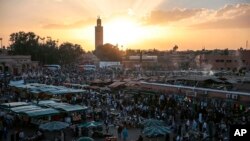Tourism accounts for 7% of gross domestic product and is a key source of foreign currency. The Tourism Ministry expects 2023 arrivals to reach 14 million by year end, with 13.2 million visitors by the end of November.
In 2022, 11 million tourists visited Morocco and in 2019, the last year before the COVID pandemic hit foreign travel, there were 13 million arrivals.
"All signs point towards hitting the 14 million milestone by December," said Tourism Minister Fatim-Zahra Ammor by email.
Morocco aims to reach 17.5 million visitors by 2026 with the launch of new airline routes, and 26 million by 2030, when it will co-host the World Cup with Spain and Portugal, Ammor said.
The sector has overcome some adverse events. September's earthquake, that ravaged villages in the High Atlas mountains, caused minor damage in Marrakech, one of Morocco's main destinations, raising concerns for the area's economy.
Business recovered there with the IMF and World Bank meeting held in the city in October, but has slumped since the start of the war in Gaza, 3,500 km (2,200 miles) away, said Faouzi Zemrani, a Marrakech tour operator.
"There have been cancellations as well as a steep drop in bookings this winter," he said.
Several hotels contacted by Reuters in Marrakech said bookings for the new year holiday season were below pre-pandemic levels.
The head of the tourism federation, Hamid Bentaher, said this winter season will be good for the hotels that diversified their markets.
Most hotels affected by the Israel-Hamas war are those that depend on Israeli tourists, he said.
Morocco agreed to boost ties with Israel in 2020 and this year the countries had said they would upgrade ties to ambassadorial level.
Moroccan tourism leaders had hoped this would prompt a big surge in Israeli tourist arrivals.
However, that is now "at a standstill," said Henri Abizker, who organizes tours for Israeli tourists, though he expected it to pick up again after the war.












Forum